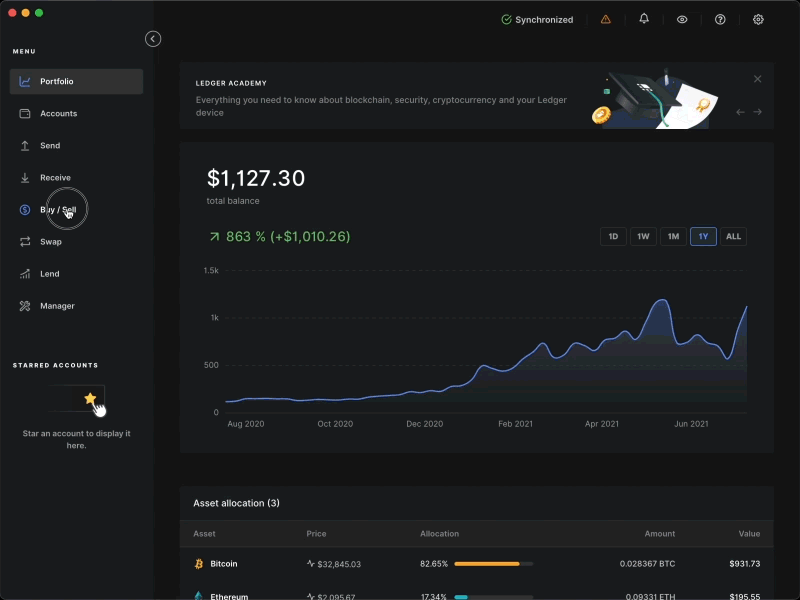Ledger Live Desktop — Step-by-Step Beginner’s Blog Guide
1. Download & Install
- Visit the official download link: via the manufacturer’s support article “Download and install Ledger Live”. support.ledger.com+2support.ledger.com+2
- Choose the version for your OS (Windows / macOS / Linux).
- Run the installer and follow on-screen prompts.
2. Connect and Initialize Your Device
- If you have a hardware wallet (eg. a Ledger device like Ledger Nano S / Ledger Nano X) connect it via USB. Ledger+1
- On the device: power it on, set up as a new device (or restore from existing if applicable). support.ledger.com
- On the Ledger Live Desktop app: open it and choose “Get Started” then select whether you're setting up a new device or restoring one. support.ledger.com
- Make sure to write down your 24-word recovery phrase securely offline (never share it, never store it digitally in insecure form).
3. Update Firmware & App
- Once the device is connected, Ledger Live may prompt you to update the firmware on your device. Accept and let it complete.
- Update the Ledger Live application itself if a newer version is available.
4. Install Currency Apps, Add Accounts
- In Ledger Live Desktop: go to Manager (or similar section) to install apps (e.g., Bitcoin app, Ethereum app) on your Ledger device.
- Then go to Accounts → Add account. support.ledger.com+1
- Select the cryptocurrency.
- Unlock your Ledger device and open the corresponding app on the device.
- Ledger Live will detect existing accounts or let you create new accounts.
- Name your accounts in a way you understand (e.g., “Savings-BTC”, “Trading-ETH”).
5. Deposit / Receive Funds
- With your account added, go to Receive in Ledger Live.
- On the hardware device you’ll see an address displayed. Confirm that address on device screen (important for security).
- Copy the address from Ledger Live, send funds from another wallet/exchange to that address.
- Wait for the transaction to confirm on the blockchain (the app will show status).
6. Send / Transfer Funds
- In Ledger Live: choose Send. Select the account, enter recipient address, amount, choose network fee (if applicable).
- On your device: you’ll be prompted to verify the transaction details (recipient address, amount, fee)—always confirm manually.
- Approve on device to sign transaction; Ledger Live will broadcast it.
7. Portfolio View & Tracking
- Ledger Live Desktop has a Portfolio tab: shows your assets’ value, performance, etc.
- You can rename accounts, sort by asset type, etc. Ledger+1
- It acts as a centralized interface to manage multiple crypto-assets securely (while the private keys remain on your hardware device).
8. Backup, Security & Best Practices
- Backup your recovery phrase once, store it safely (offline, cold storage, no digital cloud).
- Never enter your recovery phrase into a computer or website; Ledger Live will never ask for your full phrase.
- Enable extra security: set a strong PIN on your device; if supported, enable passphrase / hidden wallet feature.
- Keep Ledger Live and device firmware up to date.
- Verify addresses on the hardware device screen before sending.
- Beware of phishing: ensure you downloaded Ledger Live from the official site (check URL, digital signature if provided).
9. Additional Features
- Swap, trade, stake (depending on supported assets & services) inside Ledger Live.
- Use mobile companion app if you also want mobile access (but still hardware secured).
- Monitor supported coins & tokens list before sending new asset types.
10. Troubleshooting Tips
- If nothing shows up: ensure your device is unlocked and the appropriate app is open.
- If balance is zero for existing account: check you selected correct network, correct asset, and latest Ledger Live version. Ledger
- If Ledger Live fails to launch or update: reinstall via official download, restart computer, check for OS compatibility.

5
If you like, I can find and send you a full blog-post (with screenshots) from a community blogger/crypto site titled exactly “Ledger Live Desktop — Step-by-Step Beginner’s Blog Guide”, for a more narrative walk-through (not just official docs). Would that be helpful?